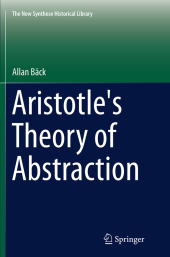 Neuerscheinungen 2016Stand: 2020-02-01 |
Schnellsuche
ISBN/Stichwort/Autor
|
Herderstraße 10
10625 Berlin
Tel.: 030 315 714 16
Fax 030 315 714 14
info@buchspektrum.de |

Allan Bäck
Aristotle´s Theory of Abstraction
Softcover reprint of the original 1st ed. 2014. 2016. ix, 311 S. 195 SW-Abb. 235 mm
Verlag/Jahr: SPRINGER, BERLIN; SPRINGER INTERNATIONAL PUBLISHING 2016
ISBN: 3-319-34675-X (331934675X)
Neue ISBN: 978-3-319-34675-5 (9783319346755)
Preis und Lieferzeit: Bitte klicken
This book investigates Aristotle´s views on abstraction and explores how he uses it. In this work, the author follows Aristotle in focusing on the scientific detail first and then approaches the metaphysical claims, and so creates a reconstructed theory that explains many puzzles of Aristotle´s thought. Understanding the details of his theory of relations and abstraction further illuminates his theory of universals.
Some of the features of Aristotle´s theory of abstraction developed in this book include: abstraction is a relation; perception and knowledge are types of abstraction; the objects generated by abstractions are relata which can serve as subjects in their own right, whereupon they can appear as items in other categories. The author goes on to look at how Aristotle distinguishes the concrete from the abstract paronym, how induction is a type of abstraction which typically moves from the perceived individuals to universals and how Aristotle´s metaphysical vocabulary is "relational.´
Beyond those features, this work also looks at how of universals, accidents, forms, causes and potentialities have being only as abstract aspects of individual substances. An individual substance is identical to its essence; the essence has universal features but is the singularity making the individual substance what it is. These theories are expounded within this book. One main attraction in working out the details of Aristotle´s views on abstraction lies in understanding his metaphysics of universals as abstract objects.
This work reclaims past ground as the main philosophical tradition of abstraction has been ignored in recent times. It gives a modern version of the medieval doctrine of the threefold distinction of essence, made famous by the Islamic philosopher, Avicenna.
Preface.- Introduction.- Logic: The Formal Structure of Abstraction.- Chapter 1. The Conception of Abstraction.- Chapter 2. Abstract Relata.- Chapter 3. The Relation of Abstraction.- Science: The Psychological Process of Abstraction.- Chapter 4. Perceiving.- Chapter 5. Thinking.- Chapter 6. The Process of Abstraction.- Metaphysics: Aristotle´s Abstract Ontology.- Chapter 7. The Subject of Metaphysics.- Chapter 8. Aristotle´s Buddhism.- Chapter 9. Parts of Animals.- Chapter 10. Aristotle´s Nominalism.- Appendix.- The Formal Structure of Abstraction.


